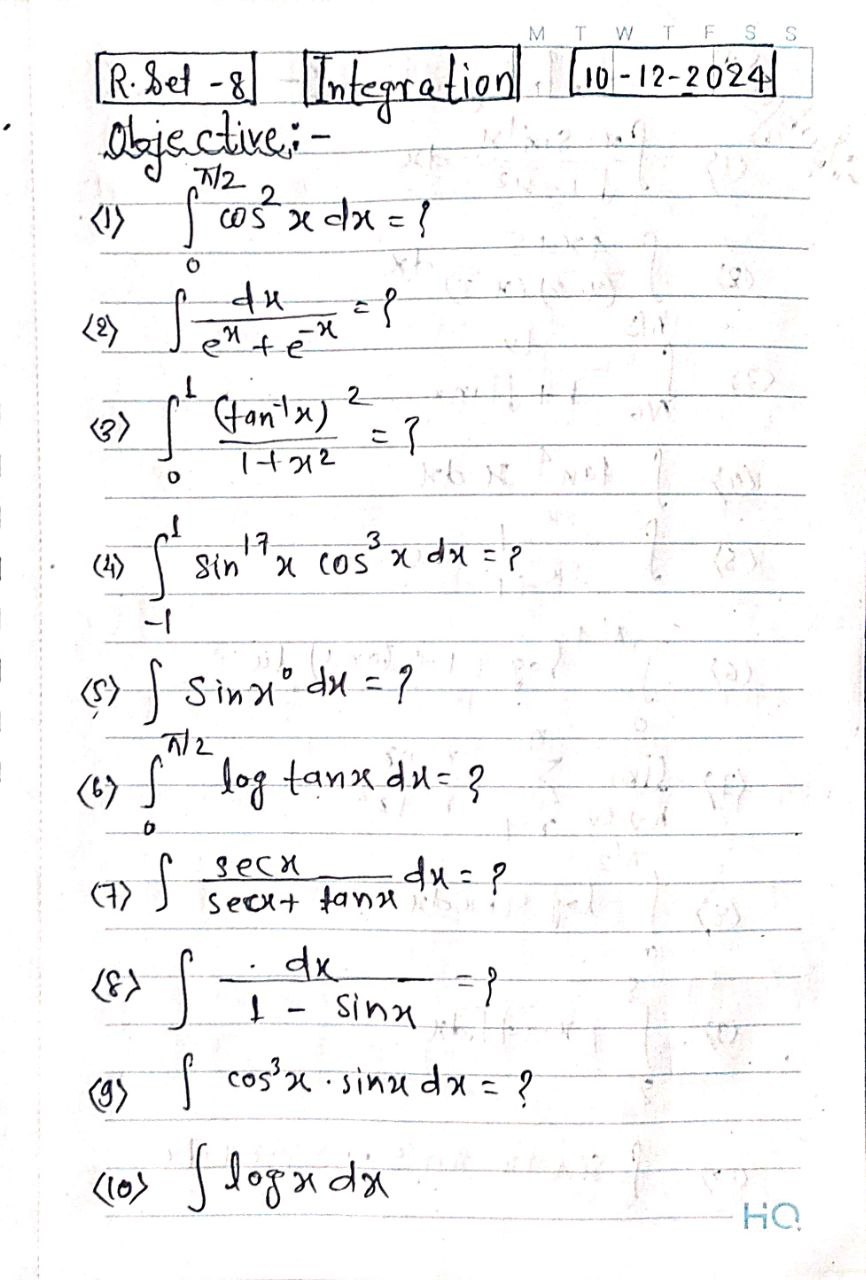1) ∫ cos²x dx = ? 0 to π/2 2) ∫ du/(e^x + e^−x) = ? 3) ∫ (tan⁻¹x)²/(1 - x²) dx = ? 0 to 1 4) ∫ sin¹⁷x * cos³x dx = ? -1 to 1 5) ∫ sinx⁰ dx = ? π/2 6) ∫ log(tanx) dx = ? 0 to... 1) ∫ cos²x dx = ? 0 to π/2 2) ∫ du/(e^x + e^−x) = ? 3) ∫ (tan⁻¹x)²/(1 - x²) dx = ? 0 to 1 4) ∫ sin¹⁷x * cos³x dx = ? -1 to 1 5) ∫ sinx⁰ dx = ? π/2 6) ∫ log(tanx) dx = ? 0 to π/2 7) ∫ secx dx/(secx + tanx) = ? 8) ∫ dx/(1 - sinx) = ? 9) ∫ cos³x * sinx dx = ? 10) ∫ logx dx = ?

Understand the Problem
The question contains a series of integration problems that require solving definite and indefinite integrals involving trigonometric, logarithmic, and exponential functions.
Answer
The integral evaluates to $\frac{\pi}{4}$.
Answer for screen readers
The value of the integral
$$ \int_0^{\frac{\pi}{2}} \cos^2 x , dx = \frac{\pi}{4} $$
Steps to Solve
- Setup the Integral We want to evaluate the integral
$$ \int_0^{\frac{\pi}{2}} \cos^2 x , dx $$
- Use Trigonometric Identity We can use the identity
$$ \cos^2 x = \frac{1 + \cos(2x)}{2} $$
to rewrite the integral:
$$ \int_0^{\frac{\pi}{2}} \cos^2 x , dx = \int_0^{\frac{\pi}{2}} \frac{1 + \cos(2x)}{2} , dx $$
- Separate the Integral This allows us to separate the integral:
$$ \int_0^{\frac{\pi}{2}} \frac{1}{2} , dx + \int_0^{\frac{\pi}{2}} \frac{\cos(2x)}{2} , dx $$
- Evaluate Each Integral Now we evaluate each integral separately.
- For the first integral:
$$ \int_0^{\frac{\pi}{2}} \frac{1}{2} , dx = \frac{1}{2} \cdot \left[\frac{\pi}{2} - 0\right] = \frac{\pi}{4} $$
- For the second integral, we use the integration of cosine:
The integral of $\cos(2x)$ is $\frac{1}{2} \sin(2x)$, thus:
$$ \int_0^{\frac{\pi}{2}} \frac{\cos(2x)}{2} , dx = \frac{1}{2} \cdot \left[ \frac{1}{2} \sin(2x) \right]_0^{\frac{\pi}{2}} = \frac{1}{4} \left( \sin(\pi) - \sin(0) \right) = 0 $$
- Combine the Results Adding both results together gives:
$$ \frac{\pi}{4} + 0 = \frac{\pi}{4} $$
The value of the integral
$$ \int_0^{\frac{\pi}{2}} \cos^2 x , dx = \frac{\pi}{4} $$
More Information
This problem uses the double angle identity for cosine and the integration of basic trigonometric functions. The result $\frac{\pi}{4}$ is significant as it's often encountered in calculus, particularly in Fourier series and definite integrals.
Tips
- Forgetting to limit the integral correctly when changing variables or using identities.
- Not properly evaluating the boundary conditions of definite integrals.
AI-generated content may contain errors. Please verify critical information